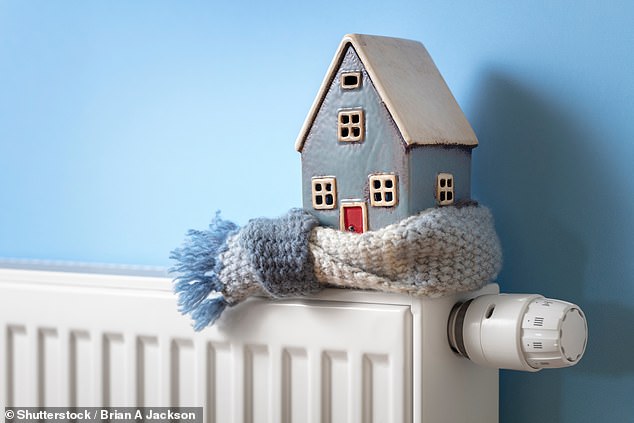I am retired and spend most days alone in the house. I am trying to avoid putting the heating on during the day to save money, but really feel the cold at times.
I am not at the poverty line, but I am losing the Winter Fuel Payment, and need to keep my energy bills down.
I spend most of my time in the living room. Would it be cheaper to turn the central heating on for a bit to warm up, or use a fan heater that I have to just heat that room?
My house is a two-bedroom Victorian terrace, and has no insulation apart from in the loft. My fan heater is 2kw, and I have a 30kw combi boiler.
Sam Barker of This Is Money replies: The cold weather is well and truly here, and with it comes higher energy bills.
The Ofgem energy price cap, currently £1,717 a year for average energy use, will increase by 1.2 per cent to £1,738 on 1 January 2025.
I am also sorry to hear you are losing your Winter Fuel Payment, which was worth up to £300 per retiree last winter.

Heating up: As the weather gets colder, our attention turns to staying warm and saving money
In a typical household, more than half of the energy bill is spent on heating and hot water, according to the Energy Saving Trust.
As such, questions about heating are some of the most common ones we are asked at This is Money.
They are, unfortunately, also almost impossible to answer with a high level of accuracy, as every house is different.
Likewise, how much you pay for energy, your appliances, how cold you get and even the length of pipework in your house all make a difference.
I have done some rough sums, which show that per hour it is much cheaper to use a fan heater than central heating – but with some very important caveats.
Ultimately, the decision between fan heater and central heating is a personal one. The sums I’m about to do are a very blunt way of approaching the issue, which should really be approached as a compromise between warmth, cost, the state of repair of your house and how you live in it during the winter months.
For example, a 2kw fan heater would cost 49p to run for one hour, assuming you are on the typical price-capped energy deal where electricity unit rates are capped at 24.5p per kilowatt-hour (kWh).
Your 30kw combi boiler, by comparison, should cost £2.06 to run your central heating for one hour, assuming you are paying 6.24p per/kWh for gas at price-capped rates and your boiler is 90 per cent efficient.
So if you are only in one room, it would be far cheaper to use your fan heater than switch the central heating on. It would even be cheaper to use your fan heater to heat one room, then take the heater into another room and heat that, than it would be to put on your central heating.
However, this is not quite a fair comparison.
Your fan heater, of course, only heats one room for 49p an hour, whereas that £2.06 figure would be the approximate cost of heating all your radiators, in multiple rooms.
You can of course turn some of your radiators off, which would lower the £2.06 per hour figure.
But there are obvious advantages to heating more than one room, both for yourself and for the good of the property itself.
Heating is important to keep rooms dry and avoid damp and mould build-up, which will also cost money to put right, and could even make you ill. Victorian houses, as I’m sure you are well aware, can be prone to this.
One good thing about central heating is that heat also radiates from pipes, even with insulation, meaning much more of the home is heated than just the parts near radiators.
The heat from a radiator also tends to linger more than that of a fan heater, as the metal of the radiator retains heat, as will any nearby brickwork.
Danielle Michalska-Morris, group technical innovation manager at David Wilson Homes, says: ‘While electric blankets and space heaters may be cheaper to run in the short-term, it’s important to remember they are only heating one part of the home and should not be left on for long periods of time.
‘Leaving electric heaters on all day is not cost-effective, for instance, a 2kW fan heater costs approximately 49p per hour when running at full power. Using it for four hours in an evening would total £1.96, and over the course of a week, it could add up to £13.72.
‘In comparison, it costs around £2 for a 24kW gas boiler to heat the entire house, so you’ll need to consider what option serves you best at the time.
‘For those that feel the cold, a good alternative to electric blankets and space heaters is a traditional hot water bottle, which means you only have to boil the kettle.’
How much do fan heaters cost to run?
Every appliance has a power rating, usually given in watts (W) or kilowatts (kW) and 1,000W equals 1kW.
This tells you the amount of electricity it uses – and how much it costs you will depend on how long it’s turned on.
Electricity is sold by kWh, which tends to come up as ‘units’ in your bill.
You can work out how much an electrical appliance costs to run by multiplying the device’s wattage by the number of hours you use it and then by the cost of electricity.
Some links in this article may be affiliate links. If you click on them we may earn a small commission. That helps us fund This Is Money, and keep it free to use. We do not write articles to promote products. We do not allow any commercial relationship to affect our editorial independence.
Source link






